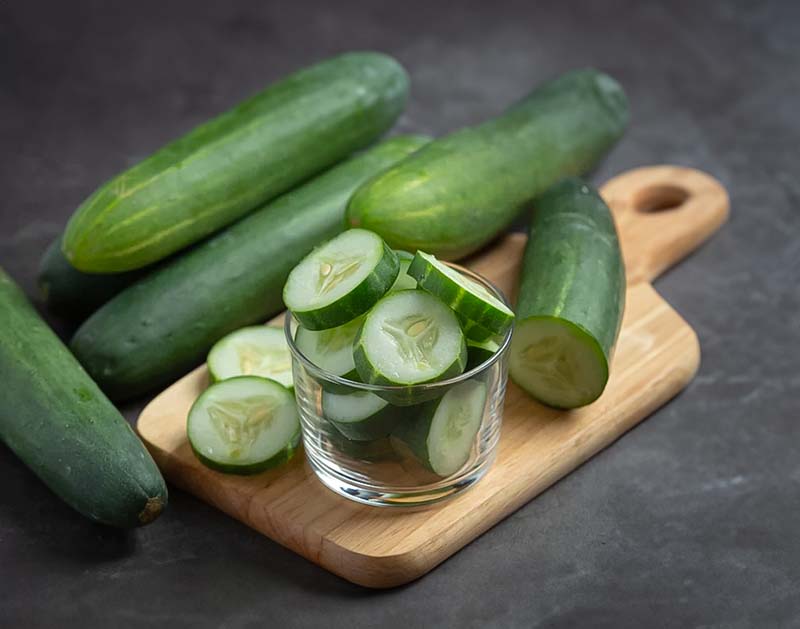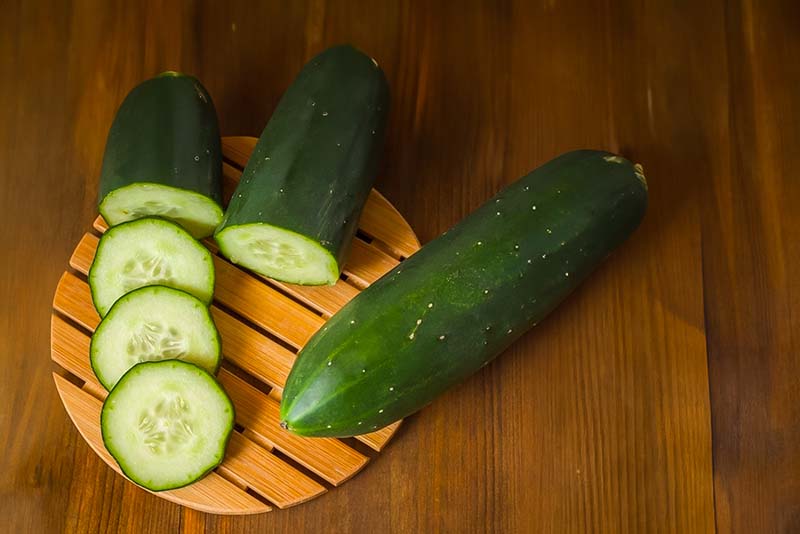Cucumbers, also referred to as ‘kheera,’ are nutrient-rich and low in calories, making them an ideal choice for those seeking healthful food options. A common question arises: “Are cucumbers effective for weight loss?” Not only do they enhance salads with their crisp texture, but they also serve as a refreshing snack.
A notable attribute of cucumbers is their easy digestibility. They are gentle on the stomach, ideal for satisfying hunger without the heaviness or bloating often associated with other foods. For those who relish the crisp taste of cucumbers and are on the lookout for a simple weight loss solution, there’s encouraging news.
Related articles
- Are Apples Good For Weight Loss? How To Eat Apples To Lose Weight?.
- Are Green Beans Good for Weight Loss? Key Insights.
- Are Lupini Beans Good for Weight Loss? Unveiling the Truth.
Are Cucumbers Good for Weight Loss?
Cucumbers are a fantastic choice for anyone focused on health and wellness, thanks to their low calorie count and high water content. They also boast a significant amount of soluble fiber, which is beneficial for both hydration and weight management. This combination makes cucumbers an excellent addition to a diet focused on healthful eating and weight loss.
Note: Besides their direct health benefits, cucumbers can play a unique role in your diet. They work well as a substitute for higher-calorie snacks. Plus, their high water content can help you feel full, which can reduce the overall amount of food consumed. This can be particularly helpful for those looking to manage their weight.

How Does the Cucumber Diet Contribute to Weight Loss?
Cucumbers are a great food for those wanting to lose weight because they don’t have many calories and are full of water and fiber. This helps you stay hydrated and feel less hungry. Cucumbers also give you some important nutrients like potassium, vitamin C, and vitamin K.
If you eat mostly cucumbers for a short time, like 7 to 14 days, you’ll probably lose weight because this diet doesn’t have many calories. But, this weight loss might not last long. Once you start eating normally again, you might gain back the weight. There aren’t any big studies that show how well the cucumber diet works for keeping weight off in the long run.
You can try this diet for different times, like 3, 7, or 14 days, depending on how much weight you want to lose. Just be aware that you might gain back some weight after you stop the diet.

What Is the Nutritional Information About Cucumber?
Cucumbers stand out as a nutritional powerhouse with their low calorie profile yet rich array of vitamins and minerals. A typical 11-ounce (300-gram) cucumber, when consumed unpeeled and raw, offers an impressive nutritional breakdown:
- Calories: A modest 45, making it an excellent choice for calorie-conscious diets.
- Fat: Virtually non-existent at 0 grams.
- Carbohydrates: 11 grams, providing a gentle energy boost.
- Protein: A surprising 2 grams, rare for a vegetable.
- Fiber: 2 grams, aiding in digestion and fullness.
- Vitamin C: Providing 14% of the Recommended Daily Intake (RDI), it supports immune function and skin health.
- Vitamin K: An abundant 62% of the RDI, crucial for blood clotting and bone health.
- Magnesium: 10% of the RDI, essential for over 300 biochemical reactions in the body.
- Potassium: 13% of the RDI, vital for blood pressure regulation.
- Manganese: Offering 12% of the RDI, important for metabolism and antioxidant functions.
However, it’s worth noting that a standard serving is roughly one-third of a cucumber, so a typical portion will deliver about a third of these nutrients.
One of the standout features of cucumbers is their high water content, at about 96%. This makes them incredibly hydrating, a perfect snack for hot days or post-workout replenishment.
To reap the full benefits of cucumbers, it’s best to consume them with their skin on. The skin is rich in fiber and contains various vitamins and minerals that are reduced once peeled.
9 Potential Health Benefits of Cucumber
Cucumbers are a remarkable vegetable, offering a plethora of health benefits due to their high water content (approximately 96% of their weight), soluble fiber, and a wealth of nutrients and antioxidants. These components collectively contribute to the prevention of various diseases.
Reduces The Risk of Cancer
Cucumbers contain lignans such as pinoresinol and lariciresinol, which have been linked to a decreased incidence of cancers like breast, uterine, ovarian, and prostate.
Additionally, cucurbitacin, a unique phytonutrient found in cucumbers, is known for its anticancer properties.

Regulates Blood Sugar Levels
The high fiber and antioxidant content in cucumbers play a crucial role in regulating blood sugar levels and reducing the risk of diabetes-related complications.
Cucumbers have a low glycemic index, meaning they have a minimal impact on blood sugar levels.

Enhances Hair and Skin Health
High in water, cucumbers aid in moisturizing the scalp, thus promoting strong, shiny, and healthy hair. They are also rich in vital minerals for hair growth, such as silicon, sulfur, and potassium.

Assists in Detoxifying the Body
The cucurbitacin in cucumbers supports healthy liver and digestive function. Their cleansing properties help in eliminating toxins from the body, aiding in detoxification.

Strengthens Bones
Cucumbers are a source of calcium, essential for strengthening bones and reducing the risk of bone-related diseases. Vitamin K, also present in cucumbers, is crucial for calcium absorption and bone formation, helping to prevent osteoporosis.

Alleviates Puffiness Around the Eyes
Cucumbers contain ascorbic and caffeic acids, two potent antioxidants that help to reduce swelling and puffiness around the eyes by minimizing water retention.

Eases Constipation
With a water content of 95% and about 2 grams of fiber, cucumbers can effectively restore the body’s fiber and water balance, preventing constipation and ensuring smooth bowel movements.
Benefits The Nervous System
Cucumbers are a good source of B vitamins, which have a calming effect on the nervous system, reducing stress and anxiety.

Contributes to Oral Health IQ
The phytochemicals in cucumbers combat harmful microorganisms in the mouth, helping to reduce bad breath.

Drawbacks of The Cucumber Diet Include
The cucumber diet, while popular for its simplicity and rapid results, comes with several significant drawbacks that are important to consider:
Restrictiveness
This diet is extremely restrictive, often limiting the diet to primarily cucumbers for up to two weeks. Following such a restrictive regime for more than three days necessitates the addition of supplementary vitamins to avoid deficiencies. This type of restrictive eating can lead to a disrupted relationship with food, potentially increasing the risk of obesity and eating disorders.
Low Protein and Fat Content
Cucumbers, though nutritious, lack substantial amounts of protein and fat – two critical macronutrients for the body. Protein plays a crucial role in various bodily functions, including enzyme and hormone production, skin structure maintenance, and muscle growth. Fat, on the other hand, is essential for providing energy, supporting nerve and brain health, and aiding in the absorption of fat-soluble vitamins like A, D, E, and K.
Lack of Sustainability
The cucumber diet is not a sustainable long-term eating plan. Its extreme calorie restriction can lead to a slower metabolism over time, potentially resulting in the regain of any lost weight. Moreover, the diet’s lack of variety, excluding essential food groups like fish, whole grains, and other fruits and vegetables, makes it not only unenjoyable but also nutritionally deficient.

Conclusion
Diving straight into the heart of the matter, “Are Cucumbers Good for Weight Loss?” Yes, cucumbers can be a beneficial component in a weight loss diet due to their low calorie count. However, it’s crucial to balance them with other nutritious foods for overall health and sustainable weight management.
Your personal experiences with cucumbers or any weight loss methods are invaluable to us. Feel free to share your stories and join the conversation. For more insights and health tips, keep checking out our blogs at HealthConnect. Let’s journey together towards a healthier lifestyle!

Dr. Joyce Slater: Your Guide to Informed Health Choices
Dr. Joyce Slater shines as a distinguished expert in the field of nutrition and public health. Contributing her vast expertise to HealthConnectbc, she embodies a deep-seated passion for enhancing public well-being. As a respected figure in her field. Dr. Slater’s academic journey and professional achievements are nothing short of inspirational.
Holding a significant position as a researcher and educator, Dr. Slater has delved deeply into the intricacies of food literacy and nutritional science. Her work, prominently featured in numerous esteemed scientific publications, underscores her dedication to expanding our understanding of food’s role in health and society.
At the heart of Dr. Slater’s professional ethos is a profound desire to positively impact individual lives through education and research. She often says, “Empowering people with the knowledge to make healthier choices is the most rewarding aspect of my work.” This principle is the cornerstone of her involvement with HealthConnectbc, where she strives to provide reliable and practical health advice.
Dr. Slater’s contributions to HealthConnectbc are multifaceted: academically, she offers insights into the complex world of nutrition and health, enhancing both public understanding and professional practices. Additionally, she is instrumental in guiding and inspiring the next generation of health professionals, thus fostering future excellence in the field.
Juggling rigorous research with her educational duties, Dr. Slater demonstrates an unwavering commitment to her profession. Her approachable nature and genuine concern transcend the confines of academia, touching the lives of everyone she interacts with. Dr. Slater looks forward to continuing her journey of discovery and education, dedicated to the ongoing improvement of public health and nutrition.
At HealthConnectbc, Dr. J. Slater is not just a contributor; she is a guiding light, dedicated to enlightening and motivating individuals towards a healthier and more informed lifestyle.
PUBLISHED ARTICLES
- Food literacy competencies: A conceptual framework for youth transitioning to adulthood (2018)
- Self-perceived eating habits and food skills of Canadians (2016)
- Challenges to acquiring and utilizing food literacy: Perceptions of young Canadian adults (2016)
- Socio-demographic and geographic analysis of overweight and obesity in Canadian adults (2009)
- Sustainable well-being: Concepts, issues, and educational practices (2014)


